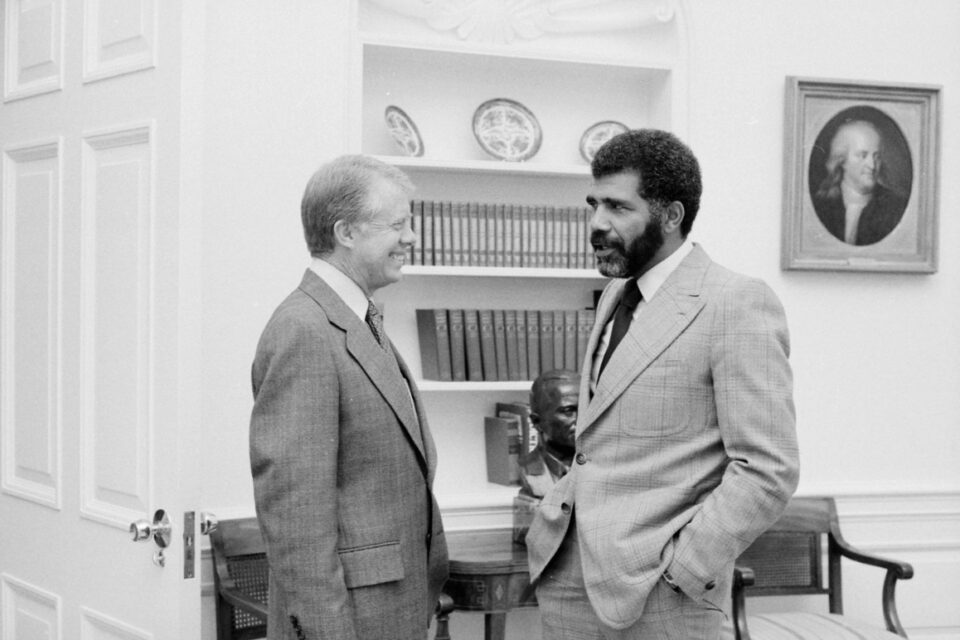Loss to Reagan Was to Some a Bad Dream
Clyburn Lauds Carter on Judgeships, Showing ‘How to Lose’
Support Journal-ismsDonations are tax-deductible.
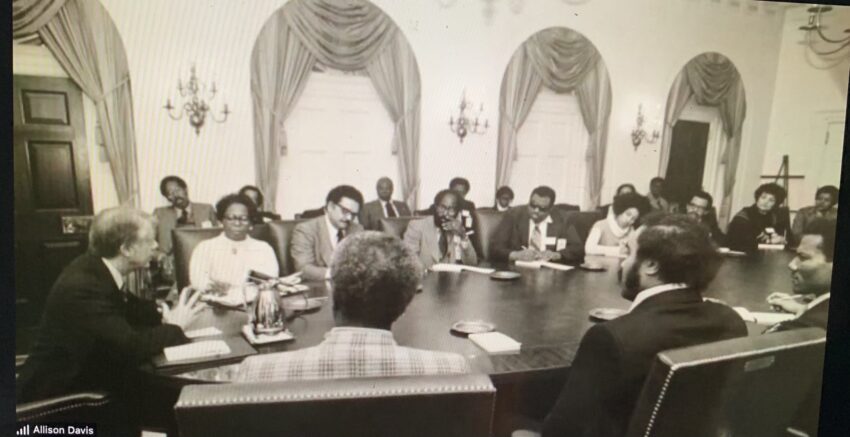
Loss to Reagan Was to Some a Bad Dream
When Jimmy Carter sat down with 29 Black media representatives at the White House on Feb. 16, 1978, he admitted that at his news conferences, the only Black reporter he remembered by name was Ed Bradley of CBS.
“At press conferences, I don’t know many of the names of the reporters who serve on the White House press pool,” Carter said. “I know we had a reception for them Christmas; we had, I think, 1,400 people who came. There are hundreds of them. And I try to do the best I can to spread the questions around. But one Black reporter that I call on every now and then is Ed Bradley with CBS. And I try to spread my questions around.”
“We’ll give you the names of our Black-owned newspapers,” came one response. Ed Bradley is with CBS.”
“Yes, I know,” Carter replied.
“We are desirous, however, [that] our Black-oriented publications have an opportunity to ask our President a question,” came the response.
“I think that’s a good idea,” Carter said.
The National Association of Black Journalists, which had 12 board members at the meeting, was not yet three years old. The session with Carter and his Cabinet “legitimized the organization to media executives,” NABJ would later say. The National Association of Black Owned Broadcasters and the National Newspaper Publishers Association, which advocates for Black-press publishers, were also represented.
Carter, at 98 the oldest living former president, has chosen to spend his final days at home in Plains, Ga., in hospice care after a series of brief hospital stays, the Carter Center announced Saturday.
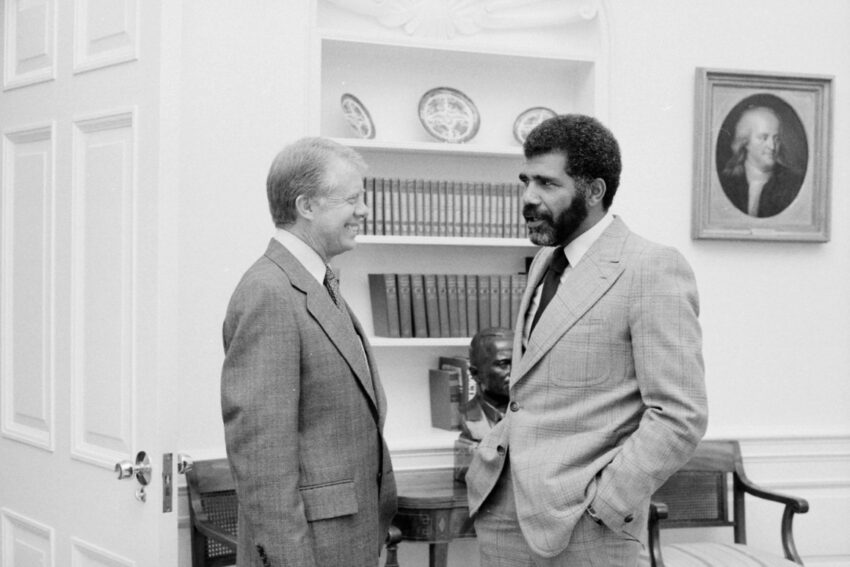
Carter beat Republican incumbent Gerald R. Ford in the 1976 presidential election, thanks to the Black vote. “The Washington Post reported that as much as 96 percent of the national black population voted for Carter, and a study conducted by the Joint Center for Political Studies in Washington, D.C. backed those findings,” recounted Marva L. Washington, who wrote a thesis on the 1976 campaign for California State University – Northridge.
But the Black press was not always in Carter’s corner. Robert S. Allison, editor of the Los Angeles Herald-Dispatch, asserted during the campaign that Carter was created and being “sold” to Blacks by the white media, Washington wrote.
During that contest, NABJ was angry that it had been snubbed. The organization invited both Ford and Carter to its first annual convention, held at Texas Southern University in Houston, but both declined, citing scheduling conflicts. However, at the last minute, Carter invited a small group of Black journalists to meet privately with him for 45 minutes in Chevy Chase, Md., Wayne Dawkins wrote in 1993’s “Black Journalists: The NABJ Story.”
 “For Carter to schedule such a meeting on the same day as the first significant black journalist conference in another city is a typical divisive tactic that caused some of the cataclysms we are witnessing in South Africa,” responded NABJ, then led by outspoken Chicago columnist Vernon Jarrett (pictured).
“For Carter to schedule such a meeting on the same day as the first significant black journalist conference in another city is a typical divisive tactic that caused some of the cataclysms we are witnessing in South Africa,” responded NABJ, then led by outspoken Chicago columnist Vernon Jarrett (pictured).
Still, some in Black media were impressed with Carter, such as John H. Johnson, publisher of Ebony and Jet magazines. In his 1989 autobiography, “Succeeding Against the Odds,” written with Lerone Bennett Jr., Johnson writes that he convened, at Carter’s request, an early-morning editorial board meeting.
“Carter walked in cold on that morning and captivated us. The first thing he said to me was, ‘Mr. Johnson, I’m glad to meet you. We’re both Morehouse Men.’ He was technically correct, for both of us had received honorary degrees from the predominantly Black college that produced Martin Luther King, Jr.
“More importantly, he was politically correct in stressing his identification with a tradition and a dream. I knew then that the peanut farmer from Plains, Georgia, was going far, and I was not surprised when he walked away with all the marbles.”
When Carter lost re-election in 1980 to Ronald Reagan, there was no disguising Black America’s sense of loss.
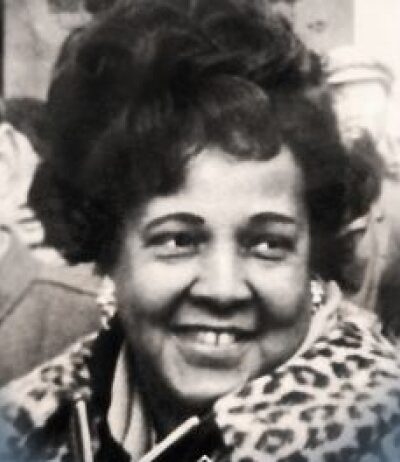 “Along towards midnight of November 4,” wrote the venerated Black journalist Ethel Payne (pictured), “the emotional reaction among blacks across the country to the landslide victory of Ronald Reagan came close to a massive breakdown,” she said, according to James McGrath Morris in his 2015 biography of Payne, “Eye on the Struggle: Ethel Payne, the First Lady of the Black Press.”
“Along towards midnight of November 4,” wrote the venerated Black journalist Ethel Payne (pictured), “the emotional reaction among blacks across the country to the landslide victory of Ronald Reagan came close to a massive breakdown,” she said, according to James McGrath Morris in his 2015 biography of Payne, “Eye on the Struggle: Ethel Payne, the First Lady of the Black Press.”
“In her own case, the election caused her to wake up in the middle of the night from a dream in which the Ku Klux Klan, the Moral Majority, and the Christian Voice — the latter two being conservative groups that triumphed in 1980 — were conducting a purge of undesirable blacks.”
While Carter made news in the mainstream press at that 1978 meeting with comments about conflict between Ethiopia and Somalia, then in the news, the African Americans around the table also asked about Black progress in the American media.
“Our administration over this past year has been very concerned about the difficulty of Black citizens and other minority groups in trying to acquire ownership of the electronic media,” Carter said in response to a question about the continuing deficit in ownership by people of color.
“And on behalf of the minority citizens of our country, we have now filed a petition directly with the Federal Communications Commission, as you know, and I have sent a message to Congress –and [deputy press secretary] Walt Wurfel or somebody can get you a copy of it -— expressing to Congress the need to ensure that in the future Black citizens and Black citizens’ groups can acquire ownership and control of the electronic media, both television and radio.”
And in a pledge echoed just last week in an executive order from President Biden, Carter said, “we have passed our goal of having $100 million in Federal money deposited in minority-owned banks, and we will meet our goal of more than 10 percent of the local public works projects being devoted or assigned to minority businesses for completion. I’ve instructed all executive agencies in the Federal Government to double in this and the next fiscal year the amount of purchases of equipment and supplies from Black or minority-owned businesses.”
The National Newspaper Publishers Association and the National Association of Hispanic Publications, along with others, have long pressed for advertising spending by government agencies in media owned by people of color.
Carter also met with Black journalists in January 1979, when, W. Dale Nelson wrote for the Associated Press, Carter declared that “Persons nominated to be federal judges will be asked whether they belong to clubs that exclude blacks or women if the Senate Judiciary Committee adopts a questionnaire it is considering,” according to Nelson’s story.
While some might consider covering the White House a dream assignment, it wasn’t seen that way by every journalist.
 Last year, Austin Long-Scott (pictured), who reported from the Carter White House, described it this way for Journal-isms:
Last year, Austin Long-Scott (pictured), who reported from the Carter White House, described it this way for Journal-isms:
“It was supposed to be a fantastic assignment, great for my professional career, one of the high honors of journalism. I would be not just a White House Correspondent, but the second African American in that job at the increasingly prestigious Washington Post that had just exposed the Watergate scandal which toppled President Richard Nixon.
“And I would be covering peanut farmer and former Georgia Gov. Jimmy Carter, the Democrat who ended eight years of GOP Presidents in 1976. But it didn’t work out the way it was supposed to. And not just because I limped up the icy White House driveway for the first few weeks on crutches, having broken my ankle during a backyard ice hockey game with my kids while visiting friends in Ottawa.
“I used to explain why it didn’t work out by describing the job this way:
“You have a desk in a tiny cubicle in the White House press area, and you’re attached to it by a 60-foot leash, which limits how far you are allowed to go to talk to White House staff, although you do have a telephone. Projecting from the ceiling above your desk is the open end of a laundry chute. From time to time a load of dirty laundry drops out of the chute and onto your desk. Your job is to sort through the dirty laundry and deduce from that and the people willing to answer your phone calls what’s really going on in the areas your leash won’t let you reach.
“That’s not really a fair description, and I would never have put it that way if I had wanted to be a full-time political reporter. But while I liked political reporting, and covered Congress and most national political conventions, I preferred social issue reporting. Social issue reporting allowed more freedom to write compellingly about the systems that trouble so many people’s lives. . . .”
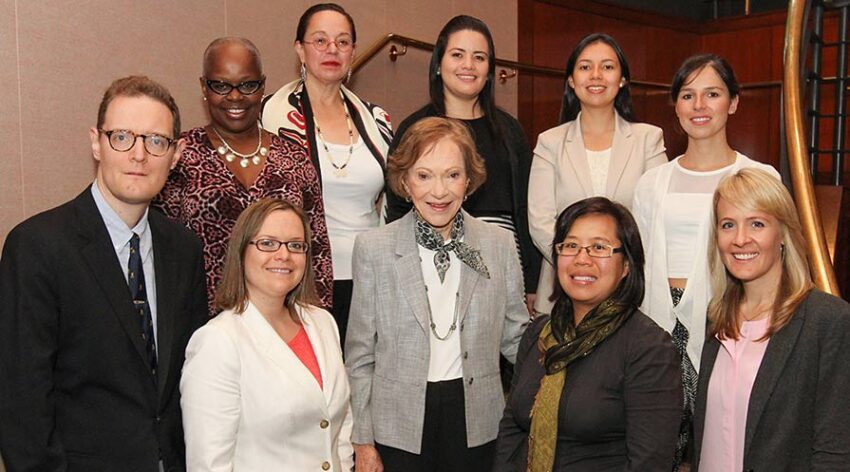
Among Carter’s legacies will be one that directly affects journalists: the Rosalynn Carter Fellowships for Mental Health Journalism.
Named for the Carter White House’s first lady, the awards seek “to develop a diverse cohort of better-informed journalists who can more effectively report on mental health and substance use across evolving and emerging platforms.” Such journalists of color as Yanick Rice Lamb, John Head, David Dent and Marissa Evans have been recipients.
“President Carter made a point of interacting with the journalism fellows at our annual meetings,” Head, a member of the 1999-2001 fellowship class, messaged Journal-isms. “In remarks and in individual conversations with us, he stressed the importance of the program’s mission. That mission included having diversity among those awarded fellowships and giving preference to projects that shined a light on the mental health needs of underserved communities. That’s why there are so many journalists of color on the fellowship roster.”
Rosalyn Carter has said, “Informed journalists can have a significant impact on public understanding of mental health issues, as they shape debate and trends with the words and pictures they convey. They influence their peers and stimulate discussion among the general public, and an informed public can reduce stigma and discrimination.”
 In August 2015, then-columnist James Ragland (pictured) assessed Carter for his Dallas Morning News column.
In August 2015, then-columnist James Ragland (pictured) assessed Carter for his Dallas Morning News column.
“The world could use more men like Jimmy Carter,” he began.
“Sure, his politics and presidency may not be everyone’s cup of tea. Those periodic rankings by presidential scholars typically aren’t kind to him.
“But whether you consider Carter an ‘average’ president or worse, which is where most of these lists peg Carter, you’d be hard-pressed to find fault with his personal life, or the ambitious humanitarian agenda he pursued after losing his re-election bid in 1980.
“The peanut farmer who became one of the most powerful political figures in the world still calls Rosalyn, his wife of 69 years, the best thing that ever happened to him.
“Excuse me for thinking that’s just awesome. . . .”
- Journal-isms: A Slight Course Correction (on death of Ronald Reagan) (June 9, 2004)
More than 40 people were on the Zoom call Sunday with Rep. James Clyburn, D-S.C., and Dennis Brownlee, founder of the African American Irish Diaspora Network; 76 others watched on Facebook. (Credit: YouTube)
Clyburn Lauds Carter on Judgeships, Showing ‘How to Lose’
Jimmy Carter should be remembered as a president who showed people “not just how to win, but how to lose,” Rep. James Clyburn, D-S.C., the House assistant Democratic leader, told the Journal-isms Roundtable Sunday. Clyburn also said Carter’s record-setting appointments of federal judges of color is too often overlooked.
Carter was asked in the Zoom conversation what the former president’s legacy would be, and how we should think about Carter’s presidency and post-presidency.
Clyburn responded:
“When I wrote my memoirs, I called it, as you can see, “Blessed Experiences: Genuinely Southern, Proudly Black.“
“That name was not by accident, it was by experiences. An experience I had when I was in the governor’s office, and I heard a white legislator, after saying something that I considered to be offensive.
 “And I approached him about it. He said to me, ‘You must understand, I’m a Southerner.’
“And I approached him about it. He said to me, ‘You must understand, I’m a Southerner.’
“Well, I didn’t think that being a Southerner gives you rights to be racist, because I, too, am a Southerner, and because of my experiences I have a set of actions, just like Jimmy Carter — Jimmy Carter’s experiences growing up in Plains, Ga., in a majority-Black community.
“He came to the conclusion, upon becoming governor, that there were certain things taking place in Georgia that should not take place, especially as it related to those people that he grew up with.
“So Jimmy Carter taught us not just how to get elected, because he did a great job of that going out . . . disrupting everybody’s conventional wisdom. Winning the Iowa contest. And going on to become the Democratic nominee, and breaking a stranglehold.
“He taught us how to win.
“But when he lost, he taught us how to lose.
“And he became . . . the real public servant after having lost his re-election, a much better public servant than he was before.
“And one of those things, if you want to find out exactly the impact that he’s had, not just the work he’s done with building houses for Habitat for Humanity, going around the world, observing elections, doing what he could to make sure elections were fair.
“But look at his appointments.
“Until [President] Biden, Jimmy Carter had the record on putting people of color on the judiciary.
“Just go take a look at the record. Most people don’t know that record, but that record is clear that he put more people of color into the federal courts, into the courts of appeal.
“Everything except the United States Supreme Court. And that’s why I decided to tell Joe Biden he needed to take that step. Jimmy Carter had done all the things we had done [but] had not done the Supreme Court, and so I think Jimmy Carter is going to go down as one who showed people not just how to win, but how to lose.”
According to the Encyclopedia of African American Society, edited by Gerald D. Jaynes, “During the administrations of Richard Nixon and Gerald Ford, no blacks were named to federal appeals courts. However, under President Jimmy Carter, the number of blacks in the federal judiciary soared. Carter appointed 38 African Americans to federal judgeships in just four years, accounting for some 15 percent of all his federal court appointments. Carter was also noted for the large number of Hispanic and female judges he appointed,
‘The Carter administration represented a high-water mark for the appointment of black federal judges.”
What Else Is Fox Fabricating for Ratings?
February 17, 2023
Indulging Racial Grievance Has a Long History
Don Lemon Missing Friday After Apology for Gaffe
Drake to Pay for Photoshopping Fake Vogue
Short Takes: Barbara Brandon-Croft; Melissa Harris-Perry and “The Takeaway”; Sam Lacy; TheHistoryMakers; Maudlyne Ihejirika; A.P. African American studies
Support Journal-ismsDonations are tax-deductible.

Indulging Racial Grievance Has a Long History
“The most prominent stars and highest-ranking executives at Fox News privately ridiculed claims of election fraud in the 2020 election, despite the right-wing channel allowing lies about the presidential contest to be promoted on its air, damning messages contained in a Thursday court filing revealed,” as Oliver Darcy reported Thursday for CNN.
Which raises a question: How much of Fox News’ race-baiting is expressing the genuine convictions of its hosts and commentators, and how much is a ploy to gain ratings and allegiance from those who feel threatened by the nation’s changing demographics?
The messages in the lawsuit against Fox, “included in a legal filing as part of Dominion Voting System’s $1.6 billion lawsuit . . . showed that Tucker Carlson, Sean Hannity, and Laura Ingraham brutally mocked lies being pushed by former President Donald Trump’s camp asserting that the election was rigged,” Darcy continued.
“In one set of messages revealed in the court filing, Carlson texted Ingraham, saying that Sidney Powell, an attorney who was representing the Trump campaign, was ‘lying’ and that he had ‘caught her’ doing so. Ingraham responded, ‘Sidney is a complete nut. No one will work with her. Ditto with Rudy [Giuliani].’
“The messages also revealed that Rupert Murdoch, the chairman of Fox Corporation, did not believe Trump’s election lies and even floated the idea of having Carlson, Hannity, and Ingraham appear together in prime time to declare Joe Biden as the rightful winner of the election. . . .” He then decided against that.
Using bigotry to appeal to receptive eyes and ears is nothing new.
“Racially inflammatory and even racist rhetoric has been part of the company’s DNA going back to his British tabloids,” David Folkenflik, author of 2013’s “Murdock’s World: The Last of the Old Media Empires,” messaged Journal-isms Friday.
“Needless to say this is not true of everyone, every title or every program. Many Fox and Murdoch journalists are appalled by such things. But it is a notable and consistent feature.
“When things get extreme enough, rebukes are handed out. Sometimes. And then we find ourselves right back in it.”
A racial breakdown of the Nielsen ratings tells the story:
For the fourth quarter of 2022:
Hannity: 0.85% of the total U.S. audience watches the show, but only 0.09% of Black people watch.
Tucker Carlson: 1.01 percent of the total U.S. audience watches the show; 0.11% of Black people do.
Total day viewing for FOX Newschannel: 0.47% of the total U.S. audience watches; 0.05 percent of Blacks do. In 1988, Roger Ailes, the man who founded Fox News, was working on the George H.W. Bush presidential campaign and promoted the infamous “Willie Horton” ad (pictured), projecting the image of Horton, depicted as a menacing Black man who received a weekend pass from prison on the watch of Bush’s Democratic opponent, Massachusetts Gov. Michael Dukakis. “Horton fled, kidnapped a young couple, stabbing the man and repeatedly raping his girlfriend,” a male narrator intoned.
In 1988, Roger Ailes, the man who founded Fox News, was working on the George H.W. Bush presidential campaign and promoted the infamous “Willie Horton” ad (pictured), projecting the image of Horton, depicted as a menacing Black man who received a weekend pass from prison on the watch of Bush’s Democratic opponent, Massachusetts Gov. Michael Dukakis. “Horton fled, kidnapped a young couple, stabbing the man and repeatedly raping his girlfriend,” a male narrator intoned.
“Even the candidate himself recoiled at trafficking in race-baiting,” Gabriel Sherman writes in his 2017 book, “The Loudest Voice in the Room: How the Brilliant, Bombastic Roger Ailes Built Fox News — and Divided the Country.” ” ‘Here’s a man who has an exemplary record on civil rights,’ Bush chief of staff Craig Fuller recalled. The Bush family hated it. . . .”
When Bush said he wanted to “get back on the issues,” Ailes replied, “We plan to do that November ninth” — the morning after election day. “Bush won by a commanding eight-point margin. It was validation that Ailes’ brand of divisive politics could win national majorities.”
In 2007, after Murdoch bought the Dow Jones Co., which produces The Wall Street Journal, there were changes in its journalism, Folkenflik wrote in “Murdoch’s World.”
“In the spring of 2009, shortly after [President Barack] Obama’s controversial stimulus bill passed Congress, the paper’s new top editors ordered up a story reporting that the bill was creating so much uncertainty among companies that it threatened the economic recovery.
“A command to gather material for the story went out to writers across the paper. The stimulus bill included some $19 billion to encourage adopting the use of electronic medical records. A reporter working on the story told me his sources at big health IT companies said the stimulus had led to an uptick in business for their firms. But that didn’t make it into the article. Was that a journalistic choice, an ideological one, or both?”
Only last May, The New York Times published Nick Confessore’s three-part, multimedia investigation of Carlson’s embrace of white supremacy and the “great replacement theory.”
The race-baiting continues. Under the headline, “Fox News’ coverage of the Ohio train derailment turned toward racial grievance and climate mockery when it became opportune,” Evlondo Cooper wrote Thursday for Media Matters for America:

“The most odious narrative pushed by Fox asserted that the East Palestine disaster had not received much attention because the area is mostly white and rural. During the February 13 episode of his show, Carlson hinted at the idea of anti-white bias when he stated, ‘What we can tell you: The Biden administration doesn’t seem too concerned about it. … Donald Trump got over 71% of the vote in the county in the last presidential election. That’s not exactly the Democratic Party’s core demographic.’
“During the February 14 episode of The Five, co-host Greg Gutfeld used the train derailment to bemoan ‘wokeism.’
“These dog whistles eventually became more explicit appeals to white grievance politics. During the February 14 episode of Jesse Watters Primetime, host Jesse Watters questioned Environmental Protection Agency Director Michael Regan’s knowledge ‘about the environment,’ asking, ‘Is this his idea of fighting environmental racism? Spilling toxic chemicals on poor white people in Ohio?’
“On the February 14 episode of Tucker Carlson Tonight, Carlson asserted that if the derailment had occurred in ‘the favored cities of Philadelphia and Detroit’ there would have been a more robust federal response. ‘But it happened to the poor, benighted town of East Palestine, Ohio, whose people are forgotten and, in the view of the people who lead this country, forgettable.’ . . .”
It’s tempting to ask what a similar court challenge would reveal about these comments.
The CNN co-host later apologized, saying, “A woman’s age doesn’t define her either personally or professionally. I have countless women in my life who prove that every day.’ (Credit: New York Post/YouTube)
Don Lemon Missing Friday After Apology for Gaffe
“The premise of a good morning-news show is that it helps viewers wake up with their morning coffee. CNN’s new A.M. entry is quickly turning into a place where the coffee is being thrown,” Brian Steinberg wrote Thursday for Variety.
“Don Lemon, one of the three anchors of ‘CNN This Morning,’ apologized Thursday afternoon for remarks made on the morning’s broadcast about when women are in their prime, during a segment about comments from new Republican presidential candidate Nikki Haley regarding the age of some of her political rivals.
“ ‘She says people, you know, politicians or something are not in their prime,’ Lemon said on the program. ‘Nikki Haley isn’t in her prime, sorry. A woman is considered to be in their prime in 20s and 30s and maybe 40s.’ The comment spurred co-anchor Poppy Harlow to try to get Lemon to modify his stance. ‘What are you talking about, wait — prime for what?’ she asked, a move that resulted in Lemon stepping even further into his position. ‘If you Google “when is a woman in her prime,” it’ll say 20s, 30s and 40s,’ he replied.
“The on-air dust-up has drawn attention both inside and outside the Warner Bros. Discovery cable-news outlet, according to a person familiar with the matter, with younger staffers taking offense and others asking how CNN can try to book prominent female politicians and newsmakers after one of its best known anchors seemed to inveigh against older women. . . .
“Lemon apologized Thursday via Twitter for his comments. ‘The reference I made to a woman’s “prime” this morning was inartful and irrelevant, as colleagues and loved ones have pointed out, and I regret it,’ he said. ‘A woman’s age doesn’t define her either personally or professionally. I have countless women in my life who prove that every day.’ . . .”
Lemon “was conspicuously absent from ‘CNN This Morning’ on Friday just 24 hours after he put his foot in his mouth,” Ariel Zilber reported for the New York Post.
Also on Friday, “CNN’s chairman, Chris Licht, opened his daily 9 a.m. editorial call by saying that the remarks by Mr. Lemon, which were widely viewed as sexist and insensitive, had left him ‘disappointed,‘ ” Michael M. Grynbaum and John Koblin reported for The New York Times.
“ ‘His remarks were upsetting, unacceptable and unfair to his co-hosts, and ultimately a huge distraction to the great work of this organization,’ Mr. Licht told his staff, according to a recording of the call obtained by The New York Times.
“It is unusual for a network chief to criticize a star anchor in such stark terms — but the situation involving Mr. Lemon and CNN’s struggling morning show is approaching a crisis point just months after its debut. . . .”
- Lachlan Cartwright, Daily Beast: Don Lemon Forced to Give Groveling Apology to CNN Staff
- Journal-isms: NABJ President Rebukes Don Lemon Over N-Word Stunt (2015) (third item)
Drake to Pay for Photoshopping Fake Vogue
 “Drake and 21 Savage have agreed to pay magazine publisher Condé Nast over a fake edition of Vogue the duo created and publicized last year,” Max Tani reported Thursday for Semafor.
“Drake and 21 Savage have agreed to pay magazine publisher Condé Nast over a fake edition of Vogue the duo created and publicized last year,” Max Tani reported Thursday for Semafor.
“In November, Vogue’s parent company filed a trademark infringement lawsuit seeking $4 million after the two rappers created a fake edition and cover of Vogue as part of the promotion for the duo’s collaborative album Her Loss.
“In an internal memo first obtained by Semafor, Condé Nast general counsel Will Bowes told staff that the company this week had received a permanent injunction barring further commercial uses of Vogue trademarks. Thursday’s memo did not disclose the settlement amount, but said that the company was granted a monetary settlement that will ‘bolster our ongoing creative output, including Vogue editorial.’
“ ‘As a creative company, we of course understand our brands may from time to time be referenced in other creative works,’ Bowes said. ‘In this instance, however, it was clear to us that Drake and 21 Savage leveraged Vogue’s reputation for their own commercial purposes and, in the process, confused audiences who trust Vogue as the authoritative voice on fashion and culture.’
“Before taking legal action, Condé Nast repeatedly asked Drake and 21 Savage to stop using the fake cover and magazine, which featured Drake with a photoshopped image of a younger Vogue editor-in-chief Anna Wintour. Bowes said the duo ignored the requests, leaving the company with ‘no other option but to take legal action.’ . . .”
Short Takes
-
 Barbara Brandon-Croft’s new book, “Where I’m Coming From: Selected Strips, 1991-2005,” hit bookstores Feb. 7 with pieces in both the New York Times and Washington Post. “The overdue salute not only provides a nostalgic trip through the lives of Brandon-Croft’s nine central female characters; the book also includes essays and letters that spotlight just how unique her achievement was,” The Post’s Michael Cavna wrote of the nation’s first nationally syndicated Black female cartoonist. “ ‘I felt like I was pushing against history,’ the Queens-based Brandon-Croft says last month during a Zoom interview. Yet she was undaunted in her early 30s, a fledgling Detroit Free Press cartoonist who was full of ‘nerves and spunk. . . . “
Barbara Brandon-Croft’s new book, “Where I’m Coming From: Selected Strips, 1991-2005,” hit bookstores Feb. 7 with pieces in both the New York Times and Washington Post. “The overdue salute not only provides a nostalgic trip through the lives of Brandon-Croft’s nine central female characters; the book also includes essays and letters that spotlight just how unique her achievement was,” The Post’s Michael Cavna wrote of the nation’s first nationally syndicated Black female cartoonist. “ ‘I felt like I was pushing against history,’ the Queens-based Brandon-Croft says last month during a Zoom interview. Yet she was undaunted in her early 30s, a fledgling Detroit Free Press cartoonist who was full of ‘nerves and spunk. . . . “
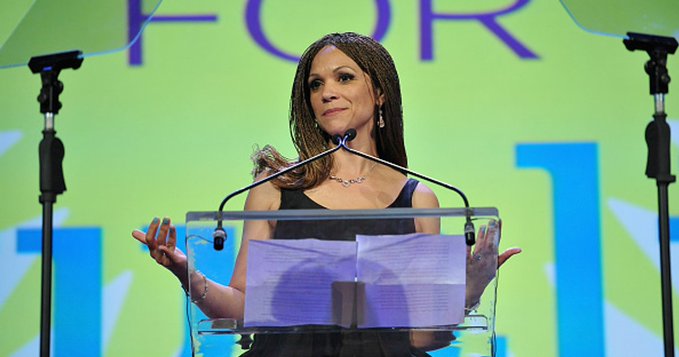
- “WNYC is canceling one of its longest-running shows,” Max Tani reported Friday for Semafor. “The New York public radio station told staff on Friday that it would not renew The Takeaway after the show’s contract runs out in June, ending a 15-year run for a daily radio program that was originally launched as WNYC’s answer to NPR’s Morning Edition.” The show is syndicated to other public radio stations. “In an email to partner stations, WNYC leaders said the show’s cancelation was the result of a loss in listeners in recent years.” In a tweet Friday afternoon, current host Melissa Harris-Perry said, “The producers, editors, directors and team of @TheTakeaway deserve SO MUCH BETTER than this. This team is exceptional. Cancelling this show in this way is an act of institutional cruelty and abuse by the executives of @WNYC. I will stand for them until the end.”
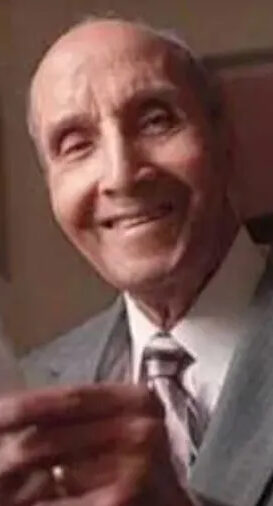 “In February for Black History Month, USA TODAY Sports is publishing the series ’28 Black Stories in 28 Days.’ ” the publication declared. “We examine the issues, challenges and opportunities Black athletes and sports officials continue to face after the nation’s reckoning on race following the murder of George Floyd in 2020.” The third installment of the series, by Stephen Borelli, featured the pioneering Sam Lacy (pictured) under the headline, “Before Stephen A. Smith and other Black sports journalists, there was the great Sam Lacy.”
“In February for Black History Month, USA TODAY Sports is publishing the series ’28 Black Stories in 28 Days.’ ” the publication declared. “We examine the issues, challenges and opportunities Black athletes and sports officials continue to face after the nation’s reckoning on race following the murder of George Floyd in 2020.” The third installment of the series, by Stephen Borelli, featured the pioneering Sam Lacy (pictured) under the headline, “Before Stephen A. Smith and other Black sports journalists, there was the great Sam Lacy.”
- “On Sunday, February 19th, at 7pm ET/PT, CBS’ 60 Minutes will air a segment featuring The HistoryMakers – the nation’s largest repository of African American video oral history,” CBS News announces in a media advisory. “The segment will focus on how the achievements of historically significant Black Americans are at risk of going unpreserved as important figures die without documenting their stories for future generations. 60 Minutes’ Bill Whitaker explores how The HistoryMakers is trying to prevent that by creating an expansive digital archive of first-person accounts of the Black experience. . . .” The HistoryMakers’ Media category features 457 of us.
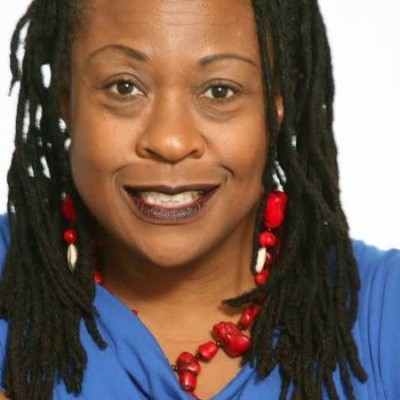 Maudlyne Ihejirika (pictured), who spent 29 years with the Chicago Sun-Times as an award-winning reporter and columnist, has joined the Field Foundation in Chicago, managing its Media & Storytelling portfolio, the foundation said Friday. From 2016 to 2022, Ihejirika wrote “Chicago Chronicles” — long-form columns of diverse and untold narratives focusing on racial, social, and economic justice issues. When she retired from the Sun-Times in December, she wrote that she planned to write another book. “Between work and raising a family, Escape From Nigeria: A Memoir of Faith, Love and War took 17 years to complete. My second, third, fourth book can NOT take 17 years,” Ihejirika wrote on social media.
Maudlyne Ihejirika (pictured), who spent 29 years with the Chicago Sun-Times as an award-winning reporter and columnist, has joined the Field Foundation in Chicago, managing its Media & Storytelling portfolio, the foundation said Friday. From 2016 to 2022, Ihejirika wrote “Chicago Chronicles” — long-form columns of diverse and untold narratives focusing on racial, social, and economic justice issues. When she retired from the Sun-Times in December, she wrote that she planned to write another book. “Between work and raising a family, Escape From Nigeria: A Memoir of Faith, Love and War took 17 years to complete. My second, third, fourth book can NOT take 17 years,” Ihejirika wrote on social media.
- “Democratic Gov. Phil Murphy said Tuesday that his administration is expanding Advanced Placement African American Studies courses next year from one school to 26 in New Jersey after Republican Gov. Ron DeSantis blocked the course from being taught in public schools in Florida,” Mike Catalini reported for the Associated Press.
To subscribe at no cost, please send an email to journal-isms+subscribe@groups.io and say who you are.
Facebook users: “Like” “Richard Prince’s Journal-isms” on Facebook.
Follow Richard Prince on Twitter @princeeditor
Richard Prince’s Journal-isms originates from Washington. It began in print before most of us knew what the internet was, and it would like to be referred to as a “column.” Any views expressed in the column are those of the person or organization quoted and not those of any other entity. Send tips, comments and concerns to Richard Prince at journal-isms+owner@
View previous columns (after Feb. 13, 2016).
View previous columns (before Feb. 13, 2016)
- Diversity’s Greatest Hits, 2018 (Jan. 4, 2019)
- Book Notes: Is Taking a Knee Really All That? (Dec. 20, 2018)
- Book Notes: Challenging ’45’ and Proudly Telling the Story (Dec. 18, 2018)
- Book Notes: Get Down With the Legends! (Dec. 11, 2018)
- Journalist Richard Prince w/Joe Madison (Sirius XM, April 18, 2018) (podcast)
- Richard Prince (journalist) (Wikipedia entry)
- February 2018 Podcast: Richard “Dick” Prince on the need for newsroom diversity (Gabriel Greschler, Student Press Law Center, Feb. 26, 2018)
- Diversity’s Greatest Hits, 2017 — Where Will They Take Us in the Year Ahead?
- Book Notes: Best Sellers, Uncovered Treasures, Overlooked History (Dec. 19, 2017)
- An advocate for diversity in the media is still pressing for representation, (Courtland Milloy, Washington Post, Nov. 28, 2017)
- Morgan Global Journalism Review: Journal-isms Journeys On (Aug. 31, 2017)
- Diversity’s Greatest Hits, 2016
- Book Notes: 16 Writers Dish About ‘Chelle,’ the First Lady
- Book Notes: From Coretta to Barack, and in Search of the Godfather
- Journal-isms’ Richard Prince Wants Your Ideas (FishbowlDC, Feb. 26, 2016)
- “JOURNAL-ISMS” IS LATEST TO BEAR BRUNT OF INDUSTRY’S ECONOMIC WOES (Feb. 19, 2016)
- Richard Prince with Charlayne Hunter-Gault, “PBS NewsHour,” “What stagnant diversity means for America’s newsrooms” (Dec. 15, 2015)
- Book Notes: Journalists Follow Their Passions
- Book Notes: Journalists Who Rocked Their World
- Book Notes: Hands Up! Read This!
- Book Notes: New Cosby Bio Looks Like a Best-Seller
- Journo-diversity advocate turns attention to Ezra Klein project (Erik Wemple, Washington Post, March 5, 2014)

